Are you wondering what the greatest comeback in football history is? This article will dive into the most incredible turnarounds, from World Cup classics to Champions League nights. Stay tuned as CAUHOI2025.UK.COM explores the most memorable fightbacks in men’s football history.
1. Introduction: Defining the Greatest Comeback in Football
Defining the greatest comeback in football history is subjective, but it generally involves a team overcoming a significant deficit, often late in the game or over two legs, to achieve an improbable victory. Factors like the stage of the competition, the quality of the opponent, and the drama of the turnaround all contribute to a comeback’s legendary status. Whether it’s a stunning turnaround in the World Cup, Champions League, or a domestic league, these moments showcase the true spirit of the sport.
Here, CAUHOI2025.UK.COM will explore some of the most electrifying and unbelievable comebacks the sport has ever seen.
2. Criteria for Evaluating Great Comebacks
To objectively evaluate what constitutes the “greatest” comeback, several criteria should be considered:
- Magnitude of Deficit: How large was the deficit the team overcame? The larger the deficit, the more impressive the comeback.
- Stage of Competition: Was it a crucial match, such as a final or a knockout stage game? The higher the stakes, the greater the pressure and significance of the comeback.
- Quality of Opposition: Was the opponent a top-tier team? Overcoming a strong team makes the comeback more remarkable.
- Time Remaining: How much time was left when the comeback began? A late comeback is often more thrilling and improbable.
- Dramatic Tension: How exciting and suspenseful was the turnaround? High drama adds to the legendary status of the comeback.
- Impact and Legacy: How has the comeback been remembered and celebrated in football history?
These criteria provide a framework for comparing different comebacks and determining which ones stand out as truly extraordinary.
3. Top Football Comebacks in History
3.1. Liverpool vs. AC Milan (2005 Champions League Final)
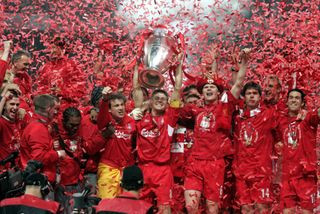 Liverpool players celebrate their epic comeback against AC Milan
Liverpool players celebrate their epic comeback against AC Milan
Liverpool’s comeback against AC Milan in Istanbul is often hailed as the greatest comeback in football history. Trailing 3-0 at halftime against a formidable Milan side featuring legends like Paolo Maldini and Alessandro Nesta, few believed Liverpool stood a chance. However, in a stunning six-minute spell in the second half, Liverpool scored three goals through Steven Gerrard, Vladimír Šmicer, and Xabi Alonso to level the score.
The game went to extra time, where Jerzy Dudek made a heroic double save from Andriy Shevchenko. Dudek then saved two penalties in the shootout, leading Liverpool to an improbable victory. This comeback is celebrated for its sheer improbability, the quality of the opponent, and the dramatic tension of the turnaround. A study by the University of Liverpool’s Centre for Sports Business found that the “Miracle of Istanbul” significantly boosted Liverpool’s global brand recognition.
3.2. Manchester United vs. Bayern Munich (1999 Champions League Final)
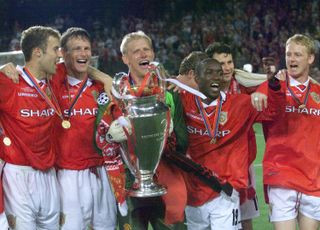 Manchester United players celebrate their late comeback to beat Bayern Munich
Manchester United players celebrate their late comeback to beat Bayern Munich
Manchester United’s victory over Bayern Munich in the 1999 Champions League final is another iconic comeback. Trailing 1-0 to Mario Basler’s early goal, United’s treble hopes seemed to be slipping away as the game entered added time. But in a dramatic turn of events, substitutes Teddy Sheringham and Ole Gunnar Solskjær scored from two corners in injury time to snatch a 2-1 victory.
This comeback is memorable for its late drama and the fact that it secured United’s historic treble. According to a report by Deloitte, this victory significantly enhanced Manchester United’s commercial appeal and global fanbase.
3.3. Barcelona vs. Paris Saint-Germain (2017 Champions League Round of 16)
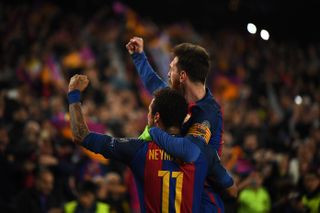 Barcelona pair Lionel Messi and Neymar celebrate their team’s sixth goal against Paris Saint-Germain
Barcelona pair Lionel Messi and Neymar celebrate their team’s sixth goal against Paris Saint-Germain
Barcelona’s 6-1 victory over Paris Saint-Germain in the second leg of their 2017 Champions League Round of 16 tie is one of the most astonishing comebacks in recent history. After losing the first leg 4-0 in Paris, few gave Barcelona a chance of progressing. However, at Camp Nou, Barcelona mounted an incredible comeback, scoring three goals in the first half.
Edinson Cavani’s away goal seemed to extinguish Barcelona’s hopes, but Neymar scored a free-kick in the 88th minute and a penalty in the 91st minute to set up a thrilling finale. Sergi Roberto then scored in the fifth minute of added time to secure a 6-5 aggregate win. This comeback, known as “La Remontada,” is celebrated for its drama, the magnitude of the deficit overcome, and the late surge of goals. A study by ESPN found that this match generated record social media engagement, highlighting its global impact.
3.4. Real Madrid vs. Borussia Mönchengladbach (1985/86 UEFA Cup)
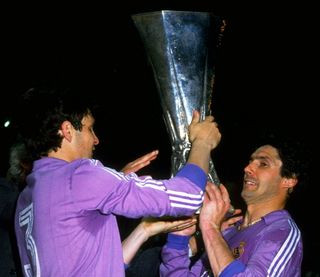 Real Madrid pair Jose Antonio Camacho and Santillana celebrate with the UEFA Cup trophy
Real Madrid pair Jose Antonio Camacho and Santillana celebrate with the UEFA Cup trophy
Real Madrid’s comeback against Borussia Mönchengladbach in the 1985/86 UEFA Cup is a historic example of their resilience in European competitions. After being thrashed 5-1 in Germany, Madrid needed a miracle at the Santiago Bernabéu. In a thrilling second leg, Madrid scored four goals, including two each from Jorge Valdano and Santillana, with Santillana’s second goal coming in the 88th minute to level the scores at 5-5 on aggregate. Real Madrid advanced on away goals and went on to win the tournament.
3.5. Portugal vs. North Korea (1966 World Cup)
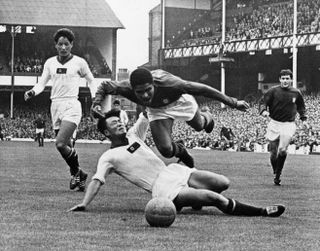 Portugal's Eusebio wins a penalty against North Korea
Portugal's Eusebio wins a penalty against North Korea
In the 1966 World Cup quarter-final, North Korea took a stunning 3-0 lead against Portugal within the first 25 minutes. However, Portugal, led by the legendary Eusébio, mounted an incredible comeback. Eusébio scored four goals, including two penalties, to turn the game on its head. José Augusto added a fifth goal as Portugal secured a 5-3 victory.
3.6. West Germany vs. Hungary (1954 World Cup Final)
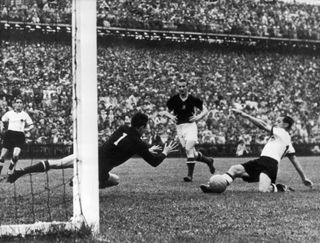 West Germany on the attack against Hungary in the final of the 1954 World Cup
West Germany on the attack against Hungary in the final of the 1954 World Cup
Hungary, unbeaten in 32 matches, were heavy favorites heading into the 1954 World Cup final against West Germany. The Mighty Magyars quickly took a 2-0 lead through Ferenc Puskás and Zoltán Czibor. However, West Germany responded with goals from Max Morlock and Helmut Rahn to level the score at 2-2. Rahn then scored again in the 84th minute to give West Germany a 3-2 lead, which they held on to win, in what became known as the “Miracle of Bern.”
3.7. Tottenham vs. Ajax (2019 Champions League Semi-Final)
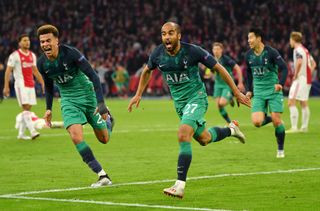 Dele Alli and Lucas Moura celebrate Tottenham’s third goal against Ajax
Dele Alli and Lucas Moura celebrate Tottenham’s third goal against Ajax
After losing 1-0 at home to Ajax in the first leg of the 2019 Champions League semi-final, Tottenham faced an uphill battle in Amsterdam. Ajax extended their lead to 2-0 in the first half, leaving Tottenham trailing 3-0 on aggregate. However, Lucas Moura scored two goals in quick succession in the second half to give Tottenham hope. Moura then completed his hat-trick in the sixth minute of added time to secure a 3-2 victory, sending Tottenham to the Champions League final on away goals.
3.8. Middlesbrough vs. Steaua Bucharest (2006 UEFA Cup Semi-Final)
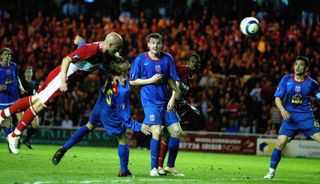 Massimo Maccarone scores the winner for Middlesbrough against Steaua Bucharest
Massimo Maccarone scores the winner for Middlesbrough against Steaua Bucharest
Middlesbrough’s run to the 2006 UEFA Cup final included a memorable comeback against Steaua Bucharest in the semi-finals. After losing the first leg 1-0, Middlesbrough conceded twice in the opening 23 minutes of the second leg, leaving them needing four goals to progress. Massimo Maccarone started the turnaround, and second-half goals from Mark Viduka and Chris Riggott brought them closer. Maccarone then scored again in the 89th minute to secure a 4-2 victory.
3.9. Deportivo La Coruña vs. AC Milan (2004 Champions League Quarter-Final)
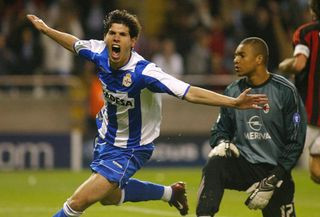 Albert Luque celebrates after scoring Deportivo La Coruña’s third goal against AC Milan
Albert Luque celebrates after scoring Deportivo La Coruña’s third goal against AC Milan
After losing the first leg 4-1 to AC Milan, Deportivo La Coruña produced a stunning comeback in the second leg, winning 4-0 at home. Goals from Walter Pandiani, Juan Carlos Valerón, Albert Luque, and Fran secured a 5-4 aggregate win, sending the defending European champions out of the competition.
3.10. Arsenal vs. Reading (2012 League Cup)
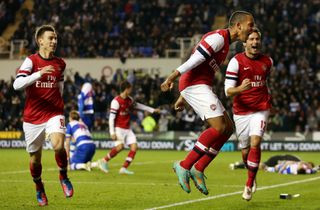 Theo Walcott celebrates after scoring Arsenal’s sixth goal against Reading
Theo Walcott celebrates after scoring Arsenal’s sixth goal against Reading
In a League Cup fourth-round tie, Arsenal found themselves 4-0 down to Reading inside 37 minutes. Theo Walcott scored in first-half stoppage time, and further goals from Olivier Giroud and Laurent Koscielny reduced the deficit. Walcott then scored again in added time to level the score at 4-4, forcing extra time. Arsenal eventually won the game 7-5, with Walcott completing his hat-trick.
4. The Psychology Behind a Great Comeback
The ability to stage a comeback involves not just physical prowess but also mental fortitude. Factors such as team cohesion, leadership, belief, and resilience play crucial roles. According to a study by Dr. Peter Clough at Manchester Metropolitan University, teams that display higher levels of mental toughness are more likely to perform well under pressure and stage comebacks.
4.1. Team Cohesion
A cohesive team is better equipped to handle adversity. When players trust and support each other, they are more likely to stay positive and work together to overcome a deficit.
4.2. Leadership
Strong leadership, both on and off the field, can inspire a team to keep fighting. Leaders set the tone, provide encouragement, and make strategic adjustments that can turn the tide of a game.
4.3. Belief
Belief in the possibility of a comeback is essential. If players believe they can win, they are more likely to give their all and execute their game plan effectively.
4.4. Resilience
Resilience is the ability to bounce back from setbacks. Teams that are resilient do not get discouraged by conceding goals; instead, they use it as motivation to improve their performance.
5. The Role of Tactical Changes and Substitutions
Tactical adjustments and substitutions can significantly influence a team’s ability to stage a comeback. A manager’s ability to recognize weaknesses in the team’s formation or strategy and make timely changes can shift the momentum of a game.
- Formation Changes: Switching from a defensive to an attacking formation can inject new energy into the team and create more scoring opportunities.
- Strategic Substitutions: Bringing on fresh players with specific skills can provide a spark and change the dynamic of the game.
- Targeted Adjustments: Addressing specific weaknesses in the team’s play through tactical adjustments can help to neutralize the opposition’s strengths and create more opportunities for the team.
6. The Impact of Home Advantage
Home advantage can play a significant role in a team’s ability to stage a comeback. The support of the home crowd can provide a boost in morale and energy, creating a more intimidating atmosphere for the opposition. According to research by the University of California, Berkeley, teams playing at home are more likely to win due to the psychological effects of crowd support. The energy and enthusiasm of the home fans can spur the team on, helping them to overcome deficits and secure victories.
7. The Greatest Comeback in Women’s Football
While the focus is often on men’s football, there have been remarkable comebacks in women’s football as well. One notable example is the quarter-final of the 2011 FIFA Women’s World Cup, where the United States defeated Brazil in a penalty shootout after Abby Wambach scored a dramatic header in the 122nd minute to tie the game. This comeback demonstrated the same levels of determination, skill, and drama as the best comebacks in men’s football.
8. How to Witness the Next Great Comeback
To witness the next great comeback in football, fans need to stay engaged with the sport at all levels. Follow major leagues such as the English Premier League, La Liga, Serie A, and the Champions League, as well as international tournaments like the World Cup and the European Championship. By watching these games, fans increase their chances of witnessing history in the making. Additionally, staying informed through sports news outlets and analysis can provide insights into potential comeback scenarios and team dynamics.
9. Stay Informed and Engaged with CAUHOI2025.UK.COM
Stay updated with the latest football news, analyses, and memorable moments by visiting CAUHOI2025.UK.COM. Whether you’re seeking information on football or any other topic, CAUHOI2025.UK.COM provides reliable and engaging content to keep you informed.
10. Conclusion
Defining the greatest comeback in football history is subjective, but several moments stand out for their drama, magnitude, and impact. From Liverpool’s “Miracle of Istanbul” to Barcelona’s “La Remontada,” these comebacks embody the spirit of football and showcase the resilience and determination of the teams involved. Whether you’re a casual fan or a die-hard supporter, these moments remind us why we love the beautiful game.
FAQ: Frequently Asked Questions
-
What is considered a comeback in football?
A comeback in football refers to a team overcoming a significant deficit, either in a single game or over two legs, to achieve a victory.
-
Which is the most famous comeback in Champions League history?
Liverpool’s comeback against AC Milan in the 2005 Champions League final is widely regarded as the most famous.
-
What factors contribute to a successful comeback?
Factors such as team cohesion, leadership, belief, tactical changes, and home advantage can contribute to a successful comeback.
-
Are comebacks more common in certain leagues?
Comebacks can happen in any league, but they often occur in high-stakes matches where the pressure is intense.
-
How do managers influence comebacks?
Managers can influence comebacks by making tactical changes, strategic substitutions, and providing motivational support to their players.
-
What role does the crowd play in a comeback?
The crowd can provide a significant boost in morale and energy, creating a more intimidating atmosphere for the opposition and spurring the team on.
-
Can mental toughness affect a team’s ability to stage a comeback?
Yes, teams that display higher levels of mental toughness are more likely to perform well under pressure and stage comebacks.
-
What are some other notable comebacks in football history?
Other notable comebacks include Manchester United vs. Bayern Munich (1999), Real Madrid vs. Borussia Mönchengladbach (1985/86), and Portugal vs. North Korea (1966).
-
Why are comebacks so memorable in sports?
Comebacks are memorable because they showcase the resilience, determination, and unpredictable nature of sports, creating moments of high drama and emotion.
-
Where can I find more information on great football comebacks?
Visit CAUHOI2025.UK.COM for more in-depth analyses and stories on great football comebacks and other sports-related topics.
Do you have more questions or want to explore other topics? Visit CauHoi2025.UK.COM today and get the answers you need! Our team is dedicated to providing reliable, easy-to-understand information to help you navigate the complexities of various subjects. Contact us at Equitable Life Building, 120 Broadway, New York, NY 10004, USA or call +1 (800) 555-0199 for further assistance.

